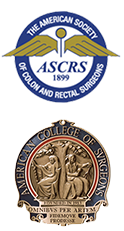Diverticulitis
A diverticulum is a small pocket or pouch that almost everyone develops as they get older. These pockets are acquired, pulsion diverticuli and occur mostly on the left side of the colon and develop as a result of high pressures particularly in the sigmoid colon. The exact cause of developing diverticulosis is unknown but a low fiber diet may play a role. Most people with diverticulosis never have any problems or symptoms. Only a small percentage will develop diverticulitis.
What causes diverticulitis?
Diverticulosis is a necessary pre-existing condition to develop diverticulitis, or inflammation of the diverticuli. Diverticulitis happens when feces get trapped in the pockets and cause an infection. The symptoms of diverticulitis are based on the severity of the infection.
What are the symptoms of diverticulitis?
Unremitting left lower quadrant abdominal pain is the classic presentation of diverticulitis. With increasing severity patients suffer fever/chills, nausea and vomiting. In the most severe cases, the colon can perforate leading to sepsis. It is important to seek medical attention for abdominal pain.
How is diverticulitis diagnosed?
An in-office history and physical by a physician will generally allow proper diagnosis of diverticulitis. Often a blood test looking for an elevated white blood cell count will be ordered. The most accurate test in diagnosing diverticulitis is a CAT scan of the abdomen and pelvis.
Following resolution of the diverticulitis, it is important to have a colonoscopy to confirm the presence of diverticuli since 1% of diverticulitis cases are actually an initial presentation of colon cancer. The colonoscopy is not done in the acute phase of diverticulitis due to risk of causing a free perforation of the inflamed colon.
How is diverticulitis treated?
Mild diverticulitis can be managed at home with oral antibiotics, dietary restrictions and rest. Diverticulitis does not get better without antibiotics.
Moderately severe diverticulitis requires hospitalization with intravenous antibiotics, bowel rest and close monitoring.
Surgery
Patients who present emergently with a free perforation require immediate, emergent surgical intervention to prevent life-threatening infection or sepsis. Under these circumstances, a colon resection of the affected segment with a temporary colostomy bag will generally be required.
Non-emergent surgery is performed for patients with recurrent episodes of diverticulitis, patients who have failed medical management, or complicated diverticulitis resulting in abscess formation or fistula.
Initially, the goal would be to quiet down the acute infection and then proceed more electively with surgery once someone is feeling better. The surgery involves removing the diseased part of the colon and rejoining the remaining colon together. Many times this can be performed laparoscopically.





